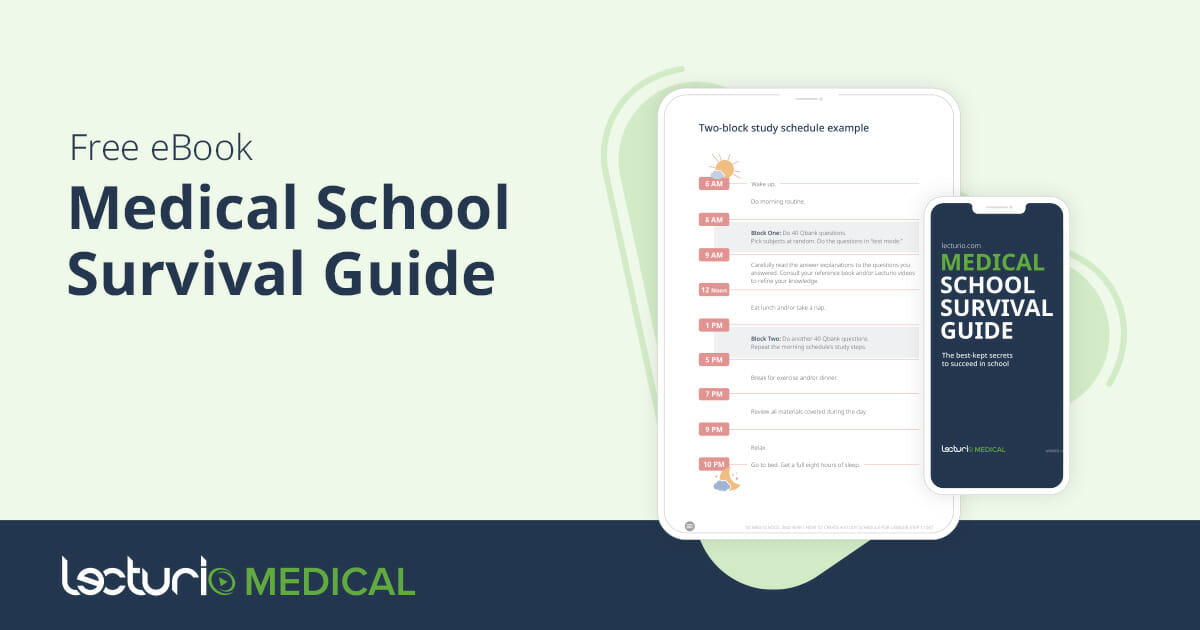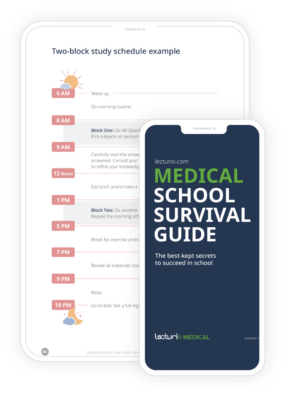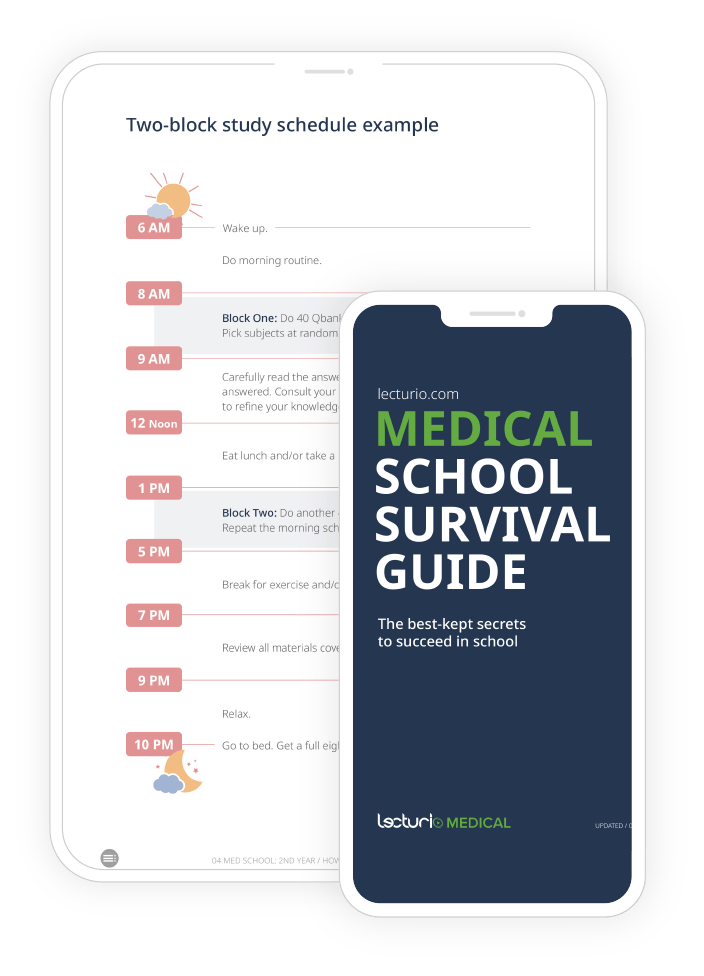Introduction
During medical school, you will spend countless hours studying. However, just as important will be making the right connections, developing good study techniques, having great mentors, and learning how to strategically plan your residency application.
If it was easy, everyone would do it.
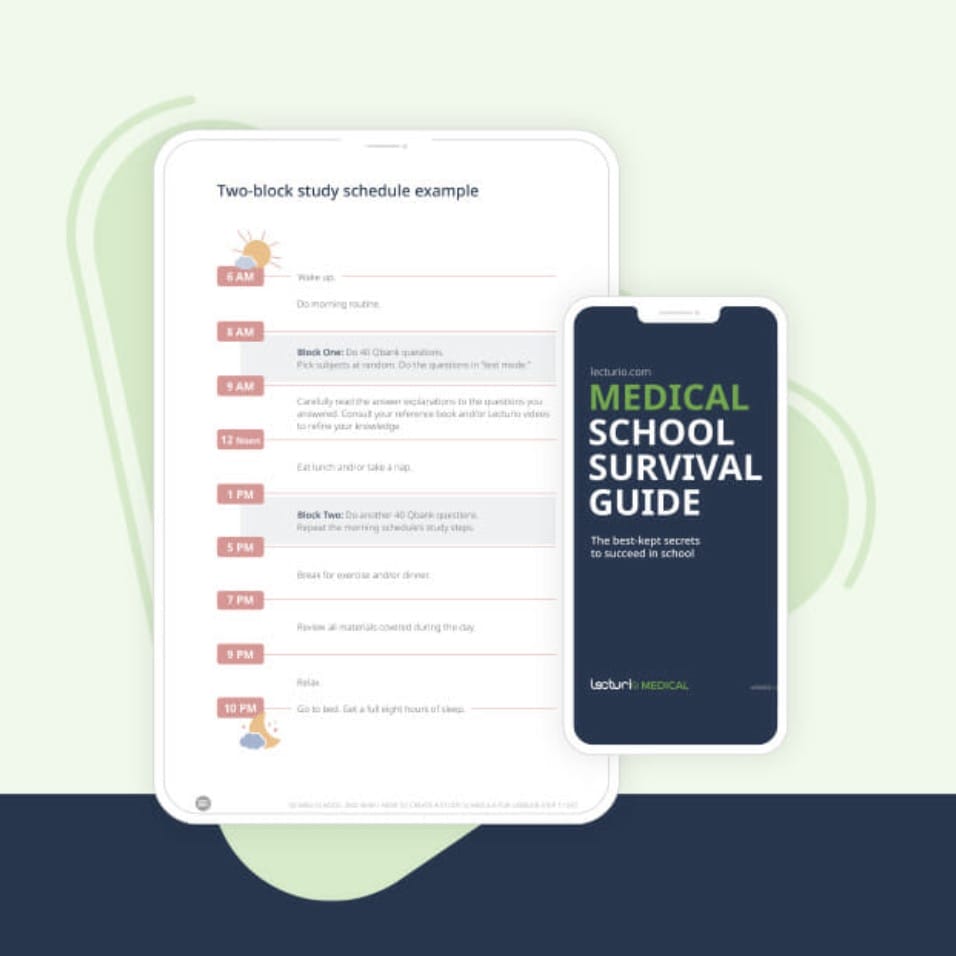
FREE eBook: Download your Survival Guide
This guide is filled with the best-kept secrets to succeed at every step throughout medical school. Take it with you and achieve your dreams!
You are already registered? Log in
PREMED: How to get into medical school, and how to prepare
How to create a convincing medical school application
Getting into medical school is tougher now than it has ever been in the past. Traditionally, students would spend four years in college, do some volunteer work and maybe some shadowing. Nowadays, you spend four years in college while probably performing various volunteer, research, and shadowing activities. You may even consider taking one to two years off to do extensive research or community service work, hoping that all this work gets you accepted into medical school.

While putting in this work will definitely help, another important part is to really know yourself and know how to present yourself:
- Self-analyze to truly know yourself:
- List the qualities that make you, you. What makes you unique?
- Which accomplishments can you list that show you are creative?
- Only if you truly know yourself, can you present yourself thoroughly and interestingly as a candidate.
- Learn how to express yourself:
- A stellar application is written well. Taking creative writing or philosophy classes early on can help you hone your writing skills.
- Don’t underestimate the personal statement – have others review it and work on it thoroughly. The downloadable Med School Survival Guide includes an example that helped someone get into med school.
- Practice and demonstrate leadership:
- Medical schools look for leaders who can perform under pressure.
- Evaluate your leadership skills and actively work to improve them.
- Participating in community service just to impress is not enough – admissions committees will see through anything you completed merely “as a performance.” Show true initiative and how you are actively involved in caring for your community.
- Don’t just rely on yourself:
- Having mentors (e.g., a physician you shadow) who enable you to get actual experiences in the medical field can help your application tremendously. It shows you know what you’re about to get into!
- Make sure you always ask for letters of recommendation. To give the committee a well-rounded picture of your personality and abilities, your application should include:
- 2 recommendations from people in areas of science
- 2 from people in areas away from science
- 2 from people in areas related to medicine (at least one physician)
How to ace the MCAT exam
An excellent MCAT score is a huge part of your ticket to medical school, and the way to get there is strategic and extensive preparation.
Tip: There is no official passing score, but it appears that most medical schools admit test-takers who earn a score of at least 508 or 509 out of a possible 528 total points.
Schools have limited seats available in each starting-year’s class. This limitation means only those who performed well as an undergraduate get in. The MCAT specifically is meant to evaluate how likely the test-taker is to do well in medical school based on their performance on the tested material.
Expect to spend at least two months rigorously studying for the MCAT. Ideally, you are following a preplanned study schedule:
- It ensures you cover all necessary material
- It helps you stay on track and manage your time
- It takes away the stress and capacity you’d otherwise need to decide what to study every day
MCAT prep study tools like Lecturio don’t only include the study materials and plan them out for you, but also make you train with MCAT-section specific Qbank questions to teach you how to answer MCAT-style questions. This way, you will already have a routine when test day comes and won’t be caught off guard by the question formats.
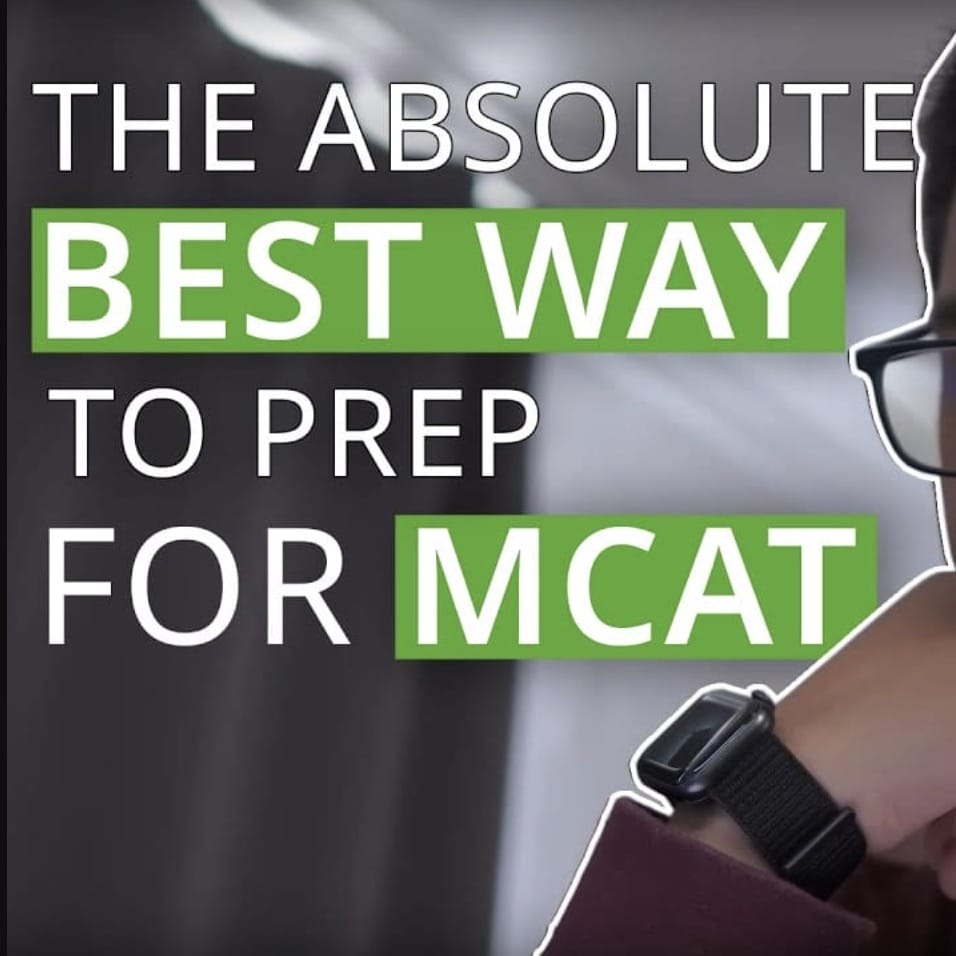
Master your MCAT with Lecturio
Explore the Qbank and study platform
8 tips for acing your medical school interview
Note: You go into the interview with a starting advantage: the committee already liked your application. Now, you want to make them like you even more.
Here are 8 top tips how to make a good impression and get through the interview smoothly:
- Show confidence from the start: Be the first to offer a handshake, keep eye contact, and show openness.
- Show maturity: Avoid referring to your childhood too much. What matters are your experiences and who you have become as an adult, your core values, strength, and development.
- Answer honestly: Truthfulness is essential. It’s okay to reflect for a few seconds before giving a reply, and it’s not the end of the world to not know or understand something and admit to that.
- Answer directly: Don’t try to mask gaps in your knowledge or deflect from embarrassing aspects of your resume. The interviewer will notice. Remember they may try to intimidate you and encounter them on eye level – as potential future colleagues.
- Anticipate questions: Most interviews will have “classic” questions that always come up. Without sounding rehearsed, having your answers to these ready to go can give you a tremendous amount of security during the interview.
- Smile, smile, smile: It is an incredibly stressful situation to be in. But, if you are able to show a genuine smile and focus on positivity and friendliness, you have a big advantage.
- Show open body language: Never cross your arms in front of your chest. Be aware of your body language, as being stressed may make you look combative, close-minded, or even cocky, even if you don’t mean to be.
- Be ready for “that” question: A common tricky question is “Tell me about your family.” The goal is to test your maturity. Credit your family for having you made the person you are today with regard to the values, views, and beliefs you hold.
7 steps to start your first day of school worry-free
With how complex and difficult the application process is, it’s easy to forget about the basics. When we say basics, we mean the literal basics: Where will you live? What will you eat? How can you spend your free time and take good care of yourself? How will you get to and from campus?
This may sound trivial, but housing, transportation, meals, and other aspects of daily living don’t fall into place on their own. Struggling with organizing these last-minute can make your start into medical school even more overwhelming than it already may be.
Follow these 7 steps to start your first day of medical school worry-free:
- Secure housing: You’ll spend a lot of time studying. Find a place that is quiet, ideally close to campus, and with enough space for a good study environment. Living with other students to connect is great as well!
- Handle transportation: Your chosen mode of transportation to and from campus mainly needs to be reliable, so that you’re not losing time and stressing over being late.
- Fuel yourself well: Medical school is a challenge in every way. Taking care of your body makes you more resilient and aids your performance. Think of ways you can meal-prep and simplify to not have to rely on frozen or fast-foods.
- Don’t ignore health issues: You want to be at your best when entering medical school. Get baseline health issues addressed, including dental and vision problems.
- Schedule in exercise: We all know exercise is good for you on all levels. Make a plan before you get overwhelmed with studying to make sure you have a routine in place that lets you take care of your body even when under pressure.
- Don’t forget about YOU and your mind: Don’t leave depression, anxiety, grief, or guilt unhandled. Again, medical school will put a strain on you. Develop the skill of introspection to allow you to periodically take stock of yourself. Please seek professional help whenever necessary.
- Build and keep a network: Don’t isolate yourself. You will be safer, happier, and more successful with a network to rely on. Make sure to stay in touch with your family and friends outside of med school (it is not your entire life!) while also connecting with your peers and building an academic support network (e.g. in the form of study groups or social media groups, or staying and chatting after class).
Should you study before medical school?
Resist the temptation to give yourself a head start studying. This applies to basic science topics as well as clinical ones, for which you would lack the foundation anyway. You’re likely to study the wrong material, with the wrong focus, and miss out on the period before medical school that you could spend relaxing, spending time with your loved ones, and just focusing on yourself before this big next step.
Especially, don’t study for the USMLE before medical school. At this stage, it is nothing but a distraction and will rob you of precious time to really learn the foundational material at the start of medical school.
If you truly can’t wait: Don’t open a random book. Go for accessible, high-yield materials like Lecturio’s video lessons to get into the flow of studying or familiarize yourself with medical terminology – anatomy has its own language, and knowing some of that beforehand can actually give you a leg up.
Related videos
YEAR 1: Learn how to study and manage being a medical student
The expert in anything was once a beginner. – Helen Hayes
So, you have been accepted into medical school and you are taking the first official steps to becoming a full-fledged physician! This is mostly exciting but it will also be tough. A lot of students are overwhelmed at first with the busy med school schedule: the classic saying is that “learning in medical school is like drinking water from a fire hydrant.” This sounds very dramatic, but you’ll definitely want to have strategies in place to manage the big amounts of information thrown at you in a short amount of time while still thriving.

How to study in medical school: 5 tips to study, read, and learn like a top student
- Set up a manageable study schedule: Planning is everything. To avoid burnout or not getting anything done, a fixed study routine with a daily time limit for studying is the safest way for you to make sure you have time for your life as well as productive study hours. It also helps avoid cramming!
- Develop effective study skills and habits:
- Time-management skills are essential.
- Don’t fall out of bed and sit down at your desk – consciously start your study time, for example with a review of what you learned the day before.
- Study in blocks of 30 minutes with breaks in between.
- If it helps you, follow rituals (e.g. going for a quick walk to mentally kick off your study time for the day).
- Learn about study concepts like spaced repetition; work with rewards; find what works best for you and stick to it!
- Learn to speed read: This is a special hack that lets you save tons of time when scanning material.
- Try studying “holistically”: Much more than just reading, involving your body, different media, different materials and methods can help you focus and retain information better and get less exhausted. For example: read aloud to stop daydreaming, use a highlighter and a pen, explain what you’ve learned to others, etc.
- Never underestimate the power of sleep: When the day does not have enough hours, it’s easy to fall into reducing sleep time. Don’t give in – good sleep hygiene makes you more powerful, happy, resilient, and healthy. Limit caffeine, limit phone time before bed, and cultivate a healthy sleep environment. You are your own best asset and can’t succeed without being well, so take good care of yourself. <3
How to use resources to get ahead in medical school
What resources you study most efficiently with can be different for everyone, but you definitely need to strategically make this decision and stick to it. Switching your style of learning and resources too often can keep you from being your most efficient.
Here are 5 tips to make resources work hard for you, not the other way around:
- Choose high-yield: With how much material you get bombarded with, identifying and focusing on what actually helps you pass your exams is essential. Make this a key priority when choosing your resources.
- Focus on long-term recall: Study resources that make it easy for you to review material periodically will help you succeed in actually retaining the information, rather than going through it once and then forgetting. Study platforms and preconfigured study plans often do that for you.
- Don’t use too many different resources: The sheer number can make it more confusing which resource you should use for which purpose. Figure out what works for you and focus on that.
- Have a reference book handy: Especially if you focus on a high-yield resource, occasionally you may want to deep-dive into the background of a topic. Lecturio, for example, has a feature called the “Bookmatcher”, with which you can scan book pages that it will then match to videos that summarize that topic, so you don’t have to read the entire thing and can save time.
- Use question banks: Answering realistic practice questions in Qbanks is one of the most tried-and-true useful ways of preparing for exams efficiently and successfully. Be aware that most Qbanks usually focus on the USMLE only, not other medical school exams. Using the Lecturio platform gives you both.
YEAR 2: It’s USMLE time!
The second year of medical school has become synonymous with the USMLE® Step 1 exam for a lot of people. While that’s not all it is (you will learn the basis for your future clinical practice in that year), let’s dive into some guidance and tips that set you up for successful preparation for the USMLE.
Study in 2 phases
Phase 1 of USMLE preparation is to review all the basic-science topics you studied in first and second year. Phase 2 is to go to Qbank bootcamp: Practice with USMLE-style questions in blocks of 40 at a time.
The First Aid book is the obvious must-have for your review. Lecturio videos are a great way to review as well (you can watch at 2x speed for materials you already feel more confident with).
When you enter the Qbank phase, you want to already have all the knowledge stored in your head and focus on applying it and getting used to the USMLE-style question format.
Maximize your use of Qbanks
Learning how to study with a Qbank is a skill on its own. Here are 7 tips on how to get the biggest benefit from USMLE-style Qbanks:
- Set the size of the question blocks to 40: This is how you simulate what the USMLE will be like. It helps train your stamina and focus to fit the requirements of the exam as early as possible, and avoid false confidence that could arise if you only work with a few questions at a time. Find a Qbank that allows you to do this (e.g., Lecturio).
- Master a strategic approach to USMLE-style questions: Understanding how the questions work and which types exist is a huge help.
- Read the last sentence of the question first to identify the question type
- Quickly scan all the answer choices first before reading the entire vignette
- Eliminate first: Getting rid of obviously wrong or irrelevant answers first narrows it down quickly.
- Take time to understand: After completing a block, carefully review the answers – understand why your answers were right or wrong.
- Get good at spotting “test craft:” The test writers craft some incorrect answers to look like right answers. Watch out for these. They’re meant to trick you into choosing them. With practice, you can get quite good at recognizing them!
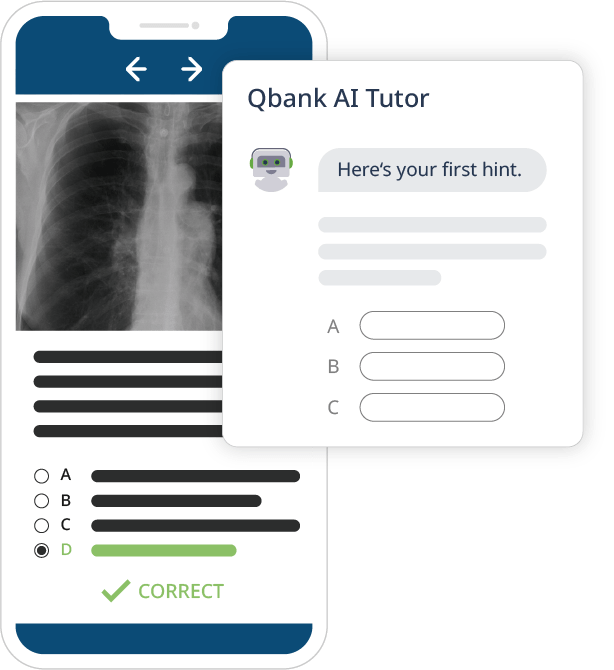
Explore Lecturo’s powerful USMLE Step 1 Qbank
Create a study schedule
What is true for studying in general and all exam preparation is even more true for the USMLE: sticking to a well-planned, thought out study schedule is the recipe for success.
Follow these 5 steps to cover everything you need to know for the USMLE:
- Note the key dates to determine how much time you have:
- The time between your second-year final exams and the USMLE test day is your window for dedicated study.
- Typically, this will be 45 to 90 days.
- Line up and choose your resources: You need the First Aid, a USMLE-style Qbank of your choice, and supplementary materials that work best for you (do you prefer videos? Text-based materials?). Choose them and stick to them.
- In Qbank study, plan to complete at least 80 Qbank questions a day: Assuming you can answer 40 questions in an hour and use an additional 3 hours for reviewing the answers, you can do 2 of these blocks in a full Qbank study day.
- Make studying fun: Studying intensely for this long, and mostly alone, can take a toll on you. Whenever you can, make it better by getting a study buddy or finding creative ways to make it more pleasant.
- Use NBME practice tests to gauge your progress: Take one 50-question NBME test each week for six weeks under timed conditions. You will build up your stamina for long fatiguing tests, and give you a clear direction on where you need to improve and adjust your study efforts.
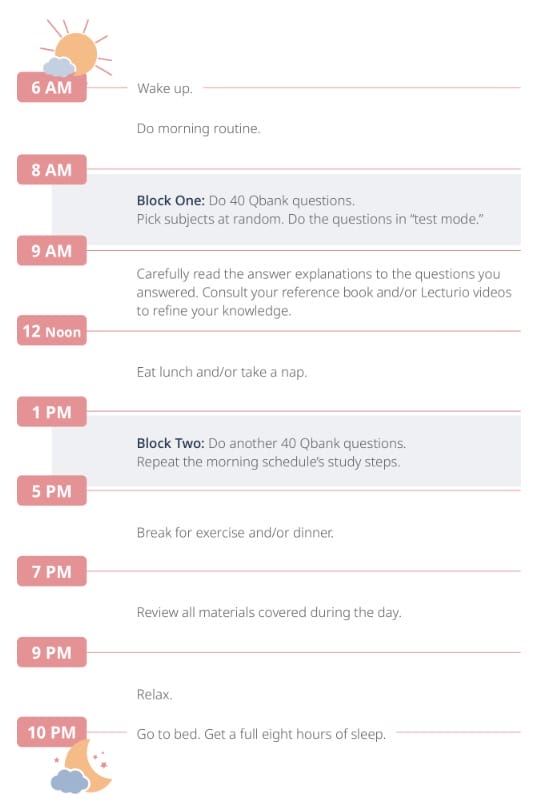
Walk into test day well prepared
Familiarize yourself with what to expect on test day to make it as worry-free as possible.
- What do you need to bring? (Multiple copies of your scheduling permit are a good idea!)
- Where do you need to go?
- How will the test be organized?
Get up early on test day, wear layered clothing to not be hot or cold in the testing room.
Exam break tips:
- Skip the test-day 15-minute tutorial – you should have seen this and more in-depth tutorials online before test day several times. You can add this saved time to your break times!
- Remember you lose a few minutes of time each time you pass through the security checkpoint to get back into the testing room.
- Use the bathroom!
- Get some good fuel into you – an apple, nuts, a sandwich and fluids are good ideas. Avoid energy drinks or foods – crashing is the last thing you want during the lengthy exam.
- Move your body in your breaks! Stretching or a full-body tense-and-release exercise can help reset your focus.
Related videos
YEAR 3: Hello patients
Patients at last! In year three, you can finally leave the classroom and enter the clinics and wards. you are wearing a crisp white coat and are ready to palpate every abdomen and auscultate every heart you can find. It’s time to put into practice what you have learned in the classroom so far. Beyond this knowledge, though, you will need to learn how to fit into a hospital team, all while still studying for and passing shelf exams as well.
5 tips to be a successful addition to your hospital team
- Understand and respect the hierarchy:
- Treat the attending with utmost respect. Ask the resident what they prefer you to do during rounds so you can accommodate them and get the most teachings in return.
- Develop a close relationship with the fellow to learn as much as you can from them.
- Treat the senior resident respectfully – they’re doing most of the work.
- Rely on the intern to help you get ready for taking part in daily rounds. This will be you soon!
- In general, practice professional behavior and politeness to everyone.
- Know your tasks and look for them:
- You will be co-carrying a few patients with the intern, presenting patients to the attending, and giving presentations to the team (practice presenting!).
- Take every opportunity to help and see a patient that you can. Showing you’re eager to learn and contribute is your chance to rise to the top of your class.
- Know your patients’ information perfectly! Stay focused in the workroom – be ready to be quizzed about your patients and their conditions all the time.
- Observe the 4th-year students and try to get to do tasks they’re doing.
- Be a team player and take responsibility:
- Be friendly, open, and engaged with the team – make it easy for them to connect and stay in contact with you.
- Pay attention to what needs to get done and figure out how you can contribute. Expert tip: Some hospitals allow sign-in from off-site – use this to peek at your patients beforehand to come in and hit the ground running.
- Ask questions: You’ve entered a team with people with loads of experience. Try to get the most out of it and ask questions!
- Don’t be passive: Don’t wait for tasks to fall into your lap. Don’t listen passively when, for example, the night team is handing over patients to your shift. Proactively ask to take over specific patients, offer things you can do, constantly look for ways to concretely make yourself useful. If you find yourself running out of tasks – you’re not. Use the time to help or learn.
How to prepare to see patients
Here are 7 steps to take when starting to see patients that help you learn to think like a physician:
- Let the team know you’re on the way when you are requested.
- Get instructions if none are given – where is the patient, how urgent is it?
- Get basic information about the patient: age, sex, chief complaint
- Look up the differential diagnoses for the chief complaint.
- Think about specific questions to ask the patient to narrow down the diagnosis.
- Think about physical exam techniques and tests – making useful suggestions is a great way to impress the senior team members.
- Be ready to answer questions about the condition with confidence. See it as a challenge – you will get it wrong now and then, and each time is a learning opportunity.
How to approach and do well on shelf exams and Step 2
Studying in parallel with being in a daily clinical setting requires new skills and comes with new opportunities. Develop new study skills that help you transfer your learnings from one to the other every day: Look up what you encounter in clinical practice during your study at home, and apply what you study directly to the clinical environment.
The same pillars of study from Step 1 and your earlier exams still apply now:
- Choose high-yield resources for each rotation
- At least one Qbank needs to be in your resource list
- A single-reference text book is essential
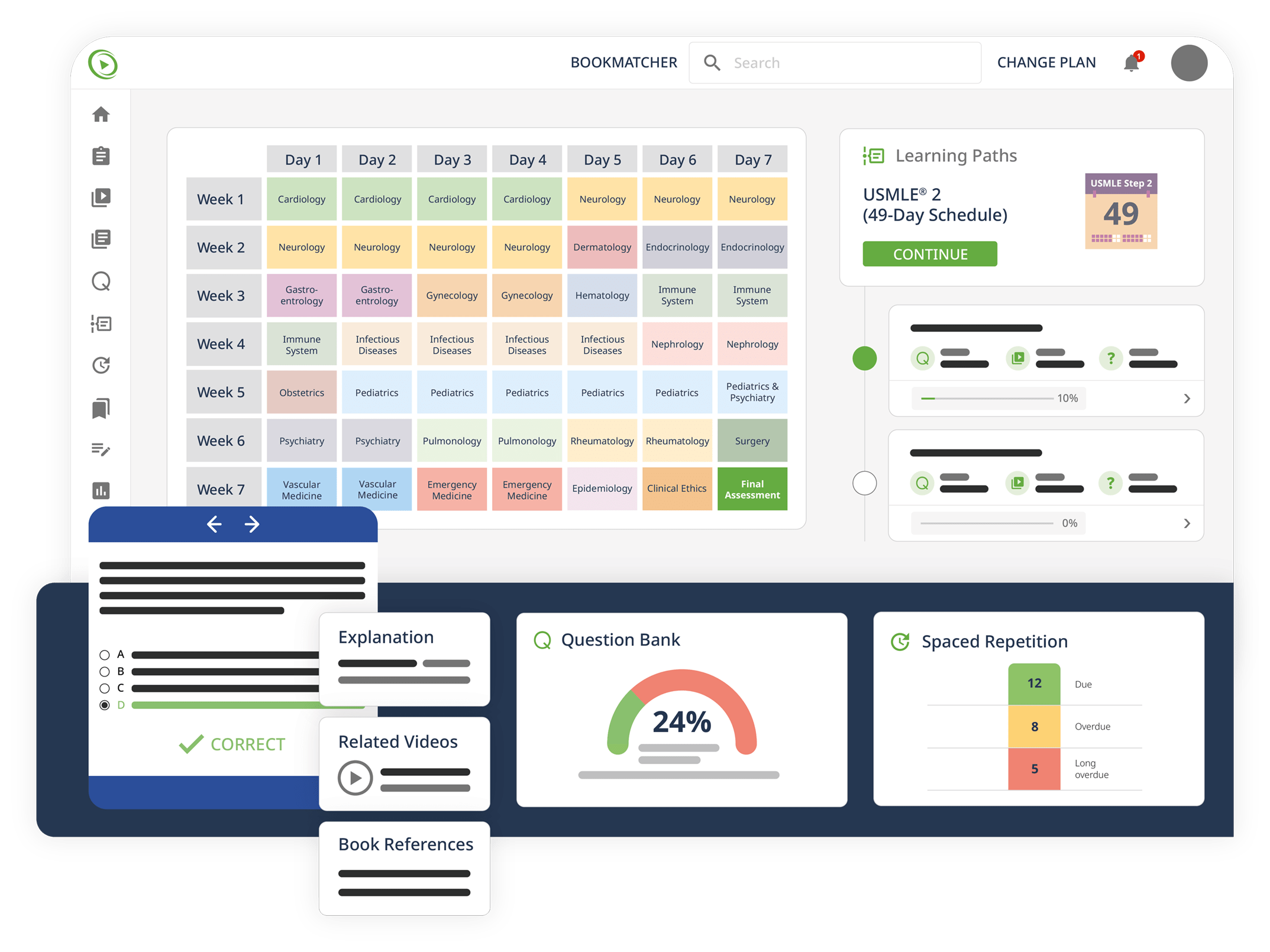
Ace Step 2 with Lecturio’s complete preparation package
Related videos
YEAR 4: Residency planning and “The Match”
The fourth year of medical school has the most number of simultaneous moving parts. Entering year 4, you have made it through the basic science years, shown your clinical skills during your core rotations of third year.
Now it is time to take all that hard work and organize it into the resident application. You will need to take USMLE Step 2, complete your sub-internships in your specialty of choice, and obtain letters of recommendation for your residency application.
3 tips on how to get letters of recommendation for residency
- Request performance feedback from attending physicians and residents: Ideally, ask them when they’re least busy. Don’t ask at the very end of the rotation – getting feedback earlier helps you improve while there’s still time. Request feedback a second time toward the end to show continued interest in growth.
- Use the word “strong” when asking the attending for a letter of recommendation. The strongest recommendations will be the ones that say you actively requested feedback – and then applied it successfully.
- Express your gratitude before the attending physician writes your letter.
Applying for residency programs (US-based or as an IMG)
Check out these tips on how to apply for residencies and match into your dream program:
- The essentials of medical residency
- How to match into your top choice residency program
- What happens if you don’t match into a residency program?
- How to prepare for a residency interview
- A day in the life of a medical resident
- What happens after residency – 5 things to expect
If you are an IMG, acceptance into a US residency program requires ECFMG certification – you’ll receive it after USMLE relays your results for all three exams and you supply proof of graduation. Complete all USMLE exams in August prior to the year you want to begin residency. Obtain an h1-B temporary worker visa via the US Citizenship & Immigration Service. Alternatively, obtain via the US embassy or consulate in your country a J-1 exchange visitor visa.
Related videos
Final words
Congratulations! You are going to become a great physician and excel in the field of medicine. How do we know this? You have already shown significant dedication by reading all this (or maybe you are just skipping ahead for a sneak peak).
Your interest in self-growth and your future is a sign that you will do marvelous things in your medical career. Regardless of where you are in your medical training, remember that the hard work will eventually pay off. A patient with Anton Syndrome (look it up – it’s an interesting neurological condition) once said: “All days are good, some are better than others.“ You will soon be there. We wish you the best of luck, and as always, enjoy your studies!
